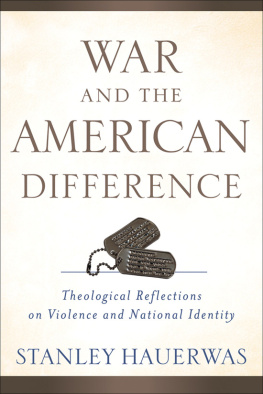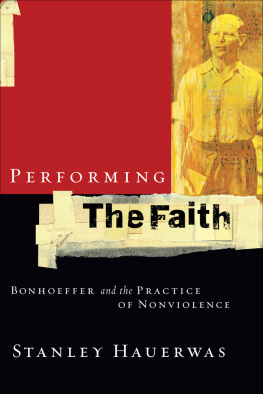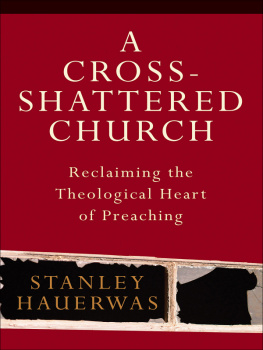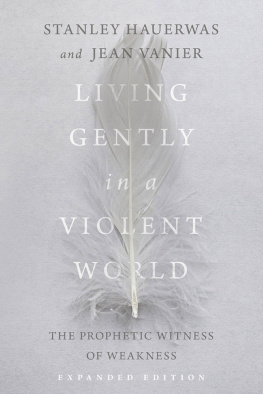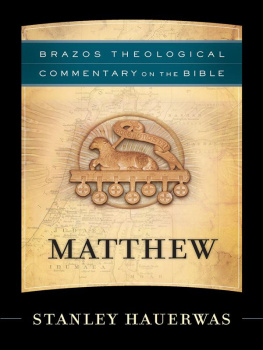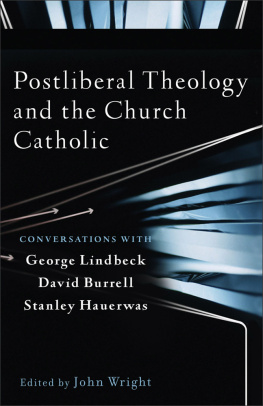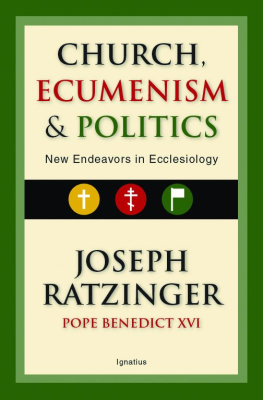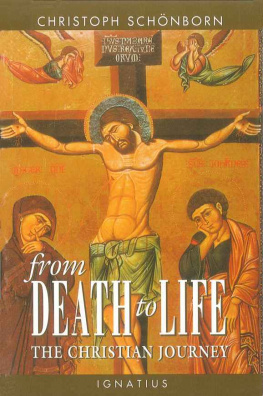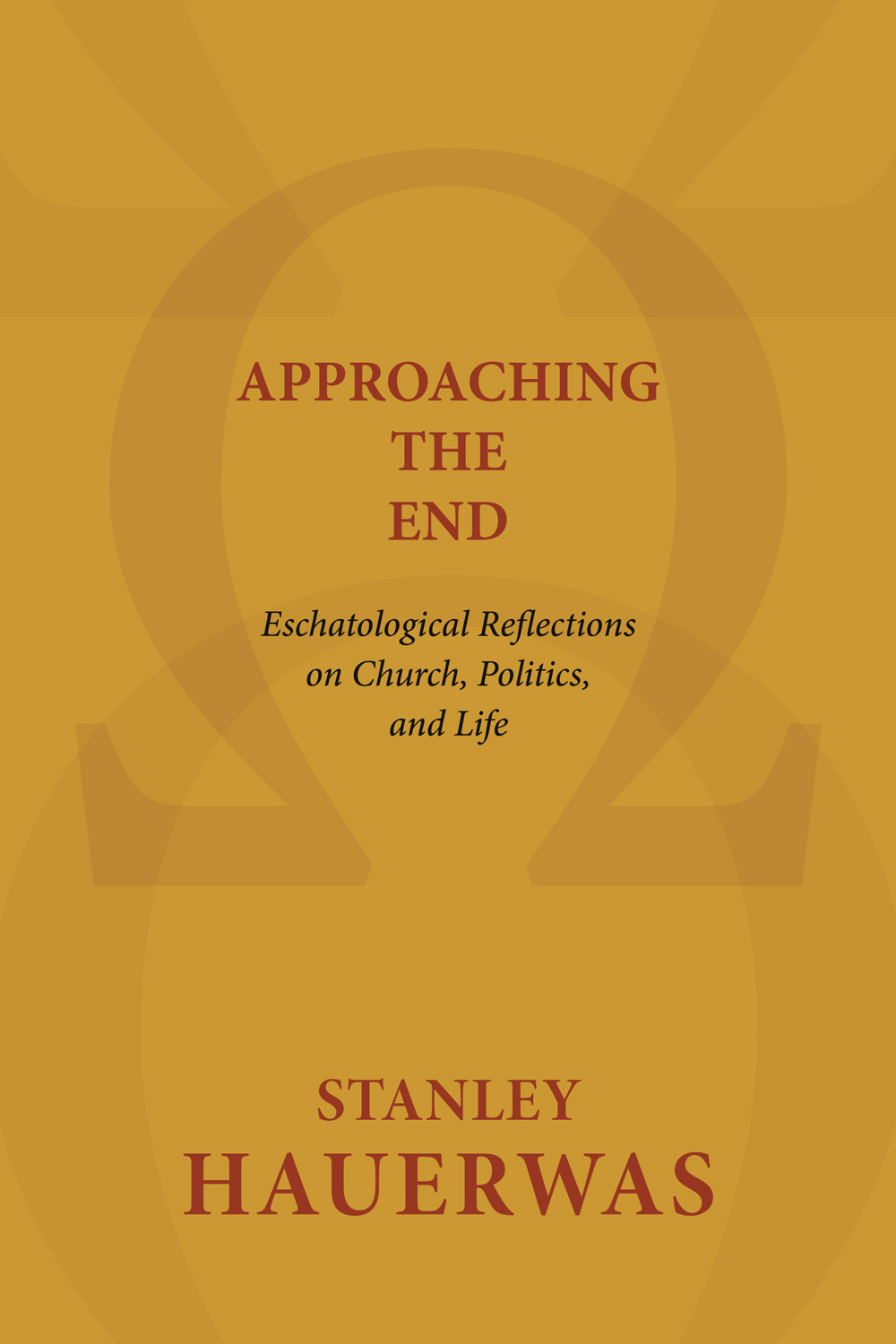2013 Stanley Hauerwas
All rights reserved
Published 2013 by
Wm. B. Eerdmans Publishing Co.
2140 Oak Industrial Drive N.E., Grand Rapids, Michigan 49505 /
P.O. Box 163, Cambridge CB3 9PU U.K.
Library of Congress Cataloging-in-Publication Data
Hauerwas, Stanley, 1940
Approaching the end: eschatological reflections on church, politics, and life /
Stanley Hauerwas.
pages cm
Includes bibliographical references and index.
ISBN 978-0-8028-6959-3 (pbk.: alk. paper)
eISBN 978-1-4674-3899-5 (ePub)
eISBN 978-1-4674-3858-2 (Kindle)
1. Hauerwas, Stanley, 1940- 2. Christianity and politics. 3. Christian life.
I. Title.
BX4827.H34A5 2013b
236 dc23
2013031430
www.eerdmans.com
Contents
I have been teaching for fortyfive years. That is what I understand myself to be a teacher. I suspect that is not how those external to Notre Dame and Duke think of me. I suspect I am thought of as a person who writes a lot and/or holds views about what it means to be a Christian that are not widely shared. Given my track record, that I am so regarded by many is quite understandable, but I hope that is not who I am. I hope I am first and foremost a teacher.
I am soon to retire. If I have any regret about retirement it is that I will miss interaction with graduate students. I am not sure how many dissertations I have directed. I am sure I do not want to know how many dissertations I have directed. To know how many would only make me tired. What I do know is that the trust students have put in me has been a gift. I have learned from every dissertation I have directed. It would, I suspect, be a fascinating investigation to show the difference students have made for how I think and what I have written over time.
To teach means you must be taught. I have never liked sentiments that suggest teachers learn more from their students than students learn from their teachers. Of course, everything depends on what you think you are learning. I think teachers should know more than students about the subject they are teaching. The more they should know is not necessarily information, but rather judgments that depend on years of close reading. Teachers can and certainly do learn from students, but that does not mean they cease being teachers.
That I will soon retire, moreover, does not mean I will stop being a teacher. As I think my students will testify, I have never limited my teaching to giving lectures, leading seminars, or directing dissertations. A teacher understands that every interaction with students in one way or another involves exchanges that are formative. This is particularly true when the interactions are about baseball. After all, baseball is a game with clear eschatological significance because it is a game that is never over.
All of this is but an attempt to say thank you to all the good people who have made me a teacher. I am particularly grateful to those who have entrusted me to direct their dissertations. To all who claim me to be their teacher I dedicate this book.
The title, Approaching the End, is deliberately ambiguous in order to reflect the different but interrelated subjects I address in this book. Any reference to the end in a book on theology usually indicates that the eschatological character of the Christian faith will be a central consideration. I hope Approaching the End meets that expectation. To the best of my ability I try to show the significance of eschatology for understanding how Christians are to negotiate the world. By doing so I hope to make clear why I have maintained that the church does not have a social ethic but is a social ethic.
Accordingly this is also a book about the church and, in particular, the end of the church. In The State of the University: Academic Knowledges and the Knowledge of God I suggested there are two questions you cannot ask about the contemporary university. Those questions are, What is it for? and Who does it serve? You cannot ask those questions because many of us who count ourselves among those who represent the university know we do not know how to answer those questions or we do not like the answers we know we should give. The same questions need to be asked about the church. But they have not been asked for reasons I suspect are very similar to why they are not asked about universities.
It may be, however, that these questions are not asked about the church because many assume that the church is in a survival mode. The end that the church is approaching, or at least some churches may be approaching, is quite literally death. So the end to which the church is moving is not a purposive end that gives order to the practices that make the church the church. Rather, the end some churches face, particularly churches for which the Reformation is their legitimating narrative, is demise. We may have already seen the end of many churches that bear the name Christian while failing to recognize that we have done so because those churches still seem to be in business. But the business they are in may have only a very accidental relation with Christianity.
There are, of course, many different kinds of churches. Not all churches seem to be experiencing the same fate as mainstream Protestantism. It is my judgment, however, a judgment I defend in Church Matters: On Faith and Politics, that churches that may currently seem to be flourishing and that includes churches in the Roman Catholic tradition as well as Protestant evangelicals are fated to endure the same end as churches in the Protestant mainstream. The church is in a buyers market that makes any attempt to form a disciplined congregational life very difficult.
There is another end that may be approaching that has implications for the church that is, we may be nearing the end of Christendom. Of course Christendom is the name used to describe quite diverse forms of societal organization, but what seems to be occurring is that the general societal approval and support the church has enjoyed particularly in America is coming to an end. Of course one of the costs Christians have paid for the social and political status they have enjoyed is not to take their Christian identity so seriously that they might destabilize the social order by, for example, challenging the presumption that war is a necessity if democracies are to survive. Thus I am long on record as thinking the loss of Christendom to be a good thing.
One of the reasons I think the waning days of Christendom to be a good thing has everything to do with the recovery of the eschatological character of the gospel. When Christians begin to think we are at home in the world our sense that we live between the times is not only muted but close to being unintelligible. The recovery of the eschatological vision is crucial for how the church understands her relation to the world.
My oft-made claim, a claim that many find offensive, that the first task of the church is not to make the world just but to make the world the world, is rightly understood only in light of these eschatological convictions. Dualities such as faith and reason, grace and nature, creation and redemption are properly to be understood in the light of the church/world alternative. The church/world alternative, moreover, must be under constant reconfiguration because what it means to be church must always be open to the work of the Holy Spirit. Rightly understood, however, the presumption that the church exists so that the world might recognize itself as world is in fact good news.
From this perspective the loss of the social and political status of the church may have made it possible for Yoders account of the politics of Jesus to at least be understood and perhaps even be thought to have the ring of truth. As long as the church has to act in a politically responsible manner she will find it hard to take her own existence as a political reality seriously. Given the eschatological presumptions that shape this book, however, the church does not so much have a political mission as her very existence is a political mission; it provides an alternative to the politics of the world. Such a view may seem counterintuitive, but I think it nonetheless true. In most matters we discover what makes us who we are or should be when we have nothing to lose.


